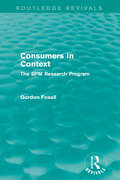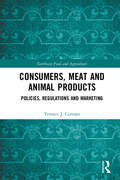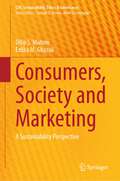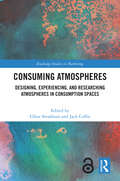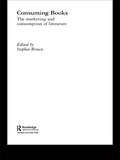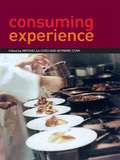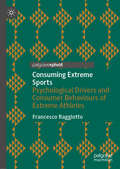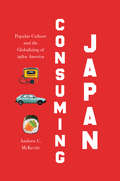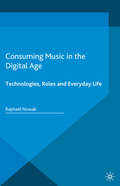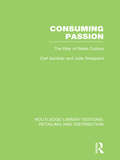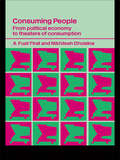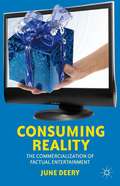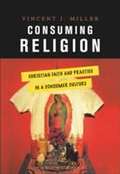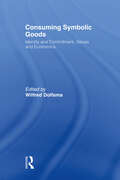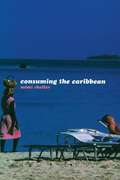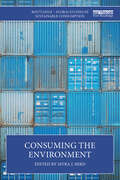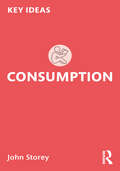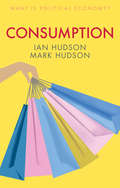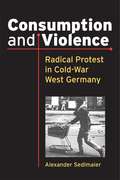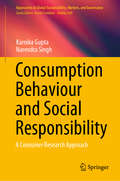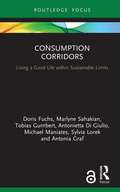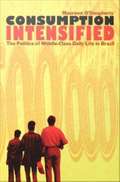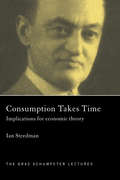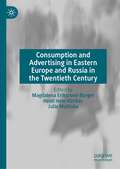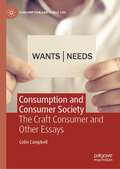- Table View
- List View
Consumers in Context: The BPM Research Program (Routledge Revivals)
by Gordon FoxallThis book, first published in 1996, presents a collection of papers by Gordon Foxall charting the development of the Behavioural Perspective Model (BPM) which he devised in the early 1980s and subsequently developed. The model offers a unique and original behaviour-based theory of consumer choice. In seeking to answer the question ‘where does consumer choice take place?’ by drawing upon behavioural psychology, Foxall presents an exciting challenge to previous theories whose emphasis has been on the internal working of the consumer’s mind in reaching rational decisions and choices. Bringing alive the important subject of economic consumption, this seminal volume will be of great interest to students and researchers in consumer research.
Consumers, Meat and Animal Products: Policies, Regulations and Marketing (Earthscan Food and Agriculture)
by Terence J. CentnerThis book addresses the production practices employed in the production of food animals and animal products that enable marketers to sell a variety of products to meet consumer demand. Food animal production practices have come under increased scrutiny by consumers who object to inputs and practices. The industry has been a proponent of using technologies to reduce production costs, resulting in lower-priced meat and animal food products, and now consumers are starting to look at other objectives. This book considers the key issues of concern to consumers, including the treatment of animals, the use of antibiotics, feed additives and hormones, and how these are monitored, regulated, and communicated to consumers. It also reviews labeling and information provided to consumers, including organic, genetic engineering, welfare standards, and place of origin. While the main focus is on the United States, there are descriptions of European practices and legislation. Overall, it aims to provide an objective and balanced appraisal, which will be of interest to advanced students and researchers in agricultural, food and environmental economics, law and policy, and animal production and welfare. It will also be very useful for early career professionals in the food and agricultural sectors.
Consumers, Society and Marketing: A Sustainability Perspective (CSR, Sustainability, Ethics & Governance)
by Dilip S. Mutum Ezlika M. GhazaliEnvironment and social responsibility are paramount for any modern business strategy, and the field of marketing is adapting itself to the new focus on sustainability. The study of the interface between consumers, society, and marketing is crucial for understanding the complex interactions between individuals and the products and services they consume and the resulting implications. In this book, the authors delve into the latest research and theories on the subject, providing insight into the various factors that shape consumer behavior and the broader impacts of marketing on society. Whether you are a student, professional, or simply curious about the topic, this book will provide a valuable resource for your learning and exploration. Instead of treating ethical foundations and critical marketing perspectives separately, this book merges them and takes a broader sustainability perspective. It examines the various ways in which businesses are incorporating sustainability into their marketing strategies, and the impact these efforts are having on consumers, the economy, and the planet. Topics covered in this book include: Evolution of marketing thoughtCritique of marketingSustainable marketingSocial marketingEvolving consumer representations and roles, and many more
Consuming Atmospheres: Designing, Experiencing, and Researching Atmospheres in Consumption Spaces (Routledge Studies in Marketing)
by Chloe Steadman Jack CoffinAtmosphere is a term often used in everyday life to describe how a consumption space feels and has long been an important theme within marketing. There has been renewed interest in atmosphere over recent years in marketing and beyond, with the concept at a crucial point in its development. However, research about atmosphere is often confined into disciplinary silos. Consuming Atmospheres unsettles such disciplinary boundaries by delivering an interdisciplinary collection of cutting-edge work on atmosphere and consumption. Specifically, the book brings together experts from various disciplinary backgrounds to explore how atmospheres are designed, experienced, and researched. Within these three thematic parts organising the collection, atmosphere is explored across a range of consumption and geographic contexts, including pop-up stores, music festivals, tourist spaces, town centres, sports stadia, amusement arcades, food and drink, urban squats, and seaside piers across England, Scotland, Denmark, and Slovenia. The book will appeal to academics and postgraduate students within marketing and beyond, given the chapter authors have backgrounds in marketing, consumer research, geography, sociology, youth studies, art and design, place management, and law. It may also be of interest to practitioners endeavouring to co-create more effective consumption atmospheres, such as marketers, retailers, and place managers.
Consuming Books: The Marketing and Consumption of Literature (Routledge Interpretive Marketing Research)
by Stephen BrownThe buying, selling, and writing of books is a colossal industry in which marketing looms large, yet there are very few books which deal with book marketing (how-to texts excepted) and fewer still on book consumption. This innovative text not only rectifies this, but also argues that far from being detached, the book business in fact epitomises today’s Entertainment Economy (fast moving, hit driven, intense competition, rapid technological change, etc.). Written by an impressive roster of renowned marketing authorities, many with experience of the book trade and all gifted writers in their own right, Consuming Books steps back from the practicalities of book marketing and takes a look at the industry from a broader consumer research perspective. Consisting of sixteen chapters, divided into four loose sections, this key text covers: * a historical overview* the often acrimonious marketing/literature interface* the consumers of books (from book groups to bookcrossing)* a consideration of the tensions that both literary types and marketers feel. With something for everyone, Consuming Books not only complements the ‘how-to’ genre but provides the depth that previous studies of book consumption conspicuously lack.
Consuming Experience
by Antonella Caru Bernard CovaThis book covers the ‘hot topic’ of the experiential consumption in an accessible manner and from a unique industry perspective which is not used in any other book. It highlights the idea that an experience is not something that can be readily managed by firms and is not limited to the market: an individual’s daily life is made up of consuming experiences that can occur with or without a market relation. Offering an overview of the consumption experience, it outlines a continuum of experiences of consumption that consumers go through, including: those that are mainly constructed by consumers around small items that comprise their daily life, such as organic products and non-profit or local associations those that have been co-developed by companies and consumers: tourism or adventure projects, rock concerts and cultural events those that have been largely developed by the companies where consumers are immersed in a hyper-real context such as fashion, sports brands, edutainment and retail. Broad and comprehensive, this book provides a challenging vision of the consumption experience, which is an invaluable tool for all those studying marketing and consumer behaviour.
Consuming Extreme Sports: Psychological Drivers and Consumer Behaviours of Extreme Athletes
by Francesco RaggiottoThis book explores the consumption behaviour of ‘extreme’ athletes from a quantitative perspective. Extreme sports are a multi-billion-dollar industry. The behaviour of athletes who participate in them differs from the majority of consumers in that they voluntarily seek out risky and dangerous situations that other consumers actively avoid. It has therefore been suggested that these consumer-athletes may have a unique psychology in this regard. The book adopts a novel approach based on established psychological theories concerning the behaviour of extreme individuals, applying and translating them into marketing research and practice. It discusses how specific psychological drivers impact the consumption behaviour of consumer-athletes and a variety of marketing-relevant outcomes. By demonstrating that extreme consumers are characterized by a unique psychology that leads them to act and think differently, this book offers scholars deeper insights into consumer behaviour, while also helping practitioners target this lucrative marketing segment more effectively.
Consuming Japan: Popular Culture and the Globalizing of 1980s America (Studies in United States Culture)
by Andrew C. McKevittThis insightful book explores the intense and ultimately fleeting moment in 1980s America when the future looked Japanese. Would Japan's remarkable post–World War II economic success enable the East Asian nation to overtake the United States? Or could Japan's globe-trotting corporations serve as a model for battered U.S. industries, pointing the way to a future of globalized commerce and culture? While popular films and literature recycled old anti-Asian imagery and crafted new ways of imagining the "yellow peril," and formal U.S.-Japan relations remained locked in a holding pattern of Cold War complacency, a remarkable shift was happening in countless local places throughout the United States: Japanese goods were remaking American consumer life and injecting contemporary globalization into U.S. commerce and culture. What impact did the flood of billions of Japanese things have on the ways Americans produced, consumed, and thought about their place in the world? From autoworkers to anime fans, Consuming Japan introduces new unorthodox actors into foreign-relations history, demonstrating how the flow of all things Japanese contributed to the globalizing of America in the late twentieth century.
Consuming Music in the Digital Age: Technologies, Roles and Everyday Life (Pop Music, Culture and Identity)
by Raphaël NowakThis book addresses the issue of music consumption in the digital era of technologies. It explores how individuals use music in the context of their everyday lives and how, in return, music acquires certain roles within everyday contexts and more broadly in their life narratives.
Consuming Passion: The Rise of Retail Culture (Routledge Library Editions: Retailing and Distribution)
by Carl Gardner Julie SheppardBritain’s high street revolution has made retailing one of the most important and dynamic sectorsof the British economy in the last twenty years. It has had an irreversible impact on our towns and cities and, for many people, transformed shopping from an unattractive domestic chore to a pleasurable ‘leisure ‘experience’, offering consumers an everchanging array of ‘disposable dreams’. The resulting ‘retail culture’ is everywhere – it has colonised huge areas of our social life outside the traditional high street, from sporting venues to arts centres, from railway termini to museums. Many see it as the epitome of Thatcher’s Britain, breeding acquisitive individualism and destroying our traditional manufacturing base. Others see it as a potential saviour of an ailing economy. Yet to date there has been no thorough analysis of this all-pervasive phenomenon, from its economic roots to its profound social effects. In Consuming Passion, Carl Gardner and Julie Sheppard have written the first overall study of the ‘retail revolution’ – a controversial and hard-hitting look at where retailing has come from, what it has achieved and where it is going. Key issues such as the role of design, the growth of the supermarket and shopping centre and the poor conditions of retail employment are all minutely examined. The book also discusses the very real pleasures that consumers gain from today’s enhanced shopping experience. The authors take an iconoclastic look at some of the powerful myths that have sprung up around retail: ‘the death of the high street’ scenario; the central role of credit; retailing as a major creator of employment; and the imminent possibility of ‘retail saturation’. A fascinating book for everyone who likes shopping – and even those who hate it. First published 1989.
Consuming People: From Political Economy to Theatres of Consumption (Routledge Studies in Consumer Research)
by Nikhilesh Dholakia A. Fuat FiratConsumption is widely regarded as one of the most important phenomena in contemporary society, but, till now, there has been very little analysis of how consumption patterns evolve, transform and proliferate. This revealing book provides an incisive treatment of consumption on a global scale from a cultural, philosophical and business perspective. Beginning with an analysis of how a dominant form of consumption pattern took hold in modern, capitalist, market economies, this book explores the contemporary changes and paradoxes in our consumption patterns during the transitional period from the modern to the postmodern. The text focuses on the forces shaping American consumption patterns, from corporations to Hollywood, and concludes with an analysis of the emerging trans-modern possibilities of the new 'theatre of consumption' where communities with a variety of consumption styles will flourish. This is an original and radical analysis in which its first-rate authors structure this key topic in a multi-disciplinary and forward-thinking way. As such, it will be of great interest to students and researchers of consumer behaviour in business and the social sciences, as well as those concerned with contemporary cultural transformations.
Consuming Reality
by June DeeryEngaging in a comprehensive examination of reality TV's advertising and promotional strategies, as well as the commodification of viewers, Consuming Reality dissects the unique and startling relation between mediation and consumption.
Consuming Religion: Christian Faith And Practice In A Consumer Culture
by Vincent MillerContemporary theology, argues Miller, is silent on what is unquestionably one of the most important cultural issues it faces: consumerism or "consumer culture." While there is no shortage of expressions of concern about the corrosive effects of consumerism from the standpoint of economic justice or environmental ethics, there is a surprising paucity of theoretically sophisticated works on the topic, for consumerism, argues Miller, is not just about behavioral "excesses"; rather, it is a pervasive worldview that affects our construction as persons-what motivates us, how we relate to others, to culture, and to religion. Consuming Religion surveys almost a century of scholarly literature on consumerism and the commodification of culture and charts the ways in which religious belief and practice have been transformed by the dominant consumer culture of the West. It demonstrates the significance of this seismic cultural shift for theological method, doctrine, belief, community, and theological anthropology. Like more popular texts, the book takes a critical stand against the deleterious effects of consumerism. However, its analytical complexity provides the basis for developing more sophisticated tactics for addressing these problems.
Consuming Symbolic Goods: Identity and Commitment, Values and Economics
by Wilfred DolfsmaThe phenomenon of consumption has increasingly drawn attention from economists. While the ‘sole purpose of production is consumption’, as Adam Smith has claimed, economists have up to recently generally ignored the topic. This book brings together a range of different perspectives on the topic of consumption that will finally shed the necessary light on a largely neglected theme, such as Why is the consumption of symbolic goods different than that of goods that are not constitutive of individuals’ identity? How does the consumption of symbolic goods affect social processes and economic phenomena? Will taking consumption (of symbolic goods) seriously impact economics itself? The book discusses these issues theoretically, and, through analyses of such cases as food, religion, fashion, empirically as well. It also discusses the possible role in the future of consumption.This book was previously published as a special issue of Review of Social Economy
Consuming the Caribbean: From Arawaks to Zombies (International Library of Sociology)
by Mimi ShellerFrom sugar to indentured labourers, tobacco to reggae music, Europe and North America have been relentlessly consuming the Caribbean and its assets for the past five hundred years. In this fascinating book, Mimi Sheller explores this troublesome history, investigating the complex mobilities of producers and consumers, of material and cultural commodities, including: foodstuffs and stimulants - sugar, fruit, coffee and rum; human bodies - slaves, indentured labourers and service workers; cultural and knowledge products - texts, music, scientific collections and ethnology; entire 'natures' and landscapes consumed by tourists as tropical paradise. Consuming the Caribbean demonstrates how colonial exploitation of the Caribbean led directly to contemporary forms of consumption of the region and its products. It calls into question innocent indulgence in the pleasures of thoughtless consumption and calls for a global ethics of consumer responsibility.
Consuming the Environment (Routledge-SCORAI Studies in Sustainable Consumption)
by Myra J. HirdConsuming the Environment explores the environmental impacts of consuming everyday products and explains how we can consume more sustainably.Written in an accessible style, this book begins with our everyday mundane experiences of consuming products – online, in the grocery store, at the mall – and shows how these practices are connected to a global system dependent upon ever increasing consumption. Drawing on the expertise of researchers in topics such as energy, food, water, land, fashion, electronics, eco-tourism, green products, and (micro)plastics, this volume unpacks the complex and largely invisible relationships that consumerism has with resource extraction and manufacturing. By focusing on a diverse range of everyday consumer products, as well as more subtle things that have been transformed into products, such as knowledge, waste, and pets, the chapters are structured around the central argument that we must re-orient ourselves as citizens rather than consumers. It is as citizens that we may help to organize our communities and hold our governments and industry accountable to planetary sustainability boundaries.With the inclusion of summary boxes, directed discussion, assignment questions, and further reading in each chapter, this book will be an essential resource for undergraduate and postgraduate students studying courses on consumerism, sustainable consumption, and environmental sociology.
Consumption (Key Ideas)
by John StoreyThis book provides a clear and wide-ranging overview of consumption as a sociological concept. Arguing that consumption is both an unavoidable part of life and an ongoing dialectical process, it gives a critical assessment of a range of theoretical approaches to the study of consumption and the possibilities these frameworks can offer. Consumption is something we all do. It is not just another word for shopping. When we eat and drink, or when we read a book or watch TV, or visit an art gallery or spend an evening in a pub, we are consuming. There is not ‘a world of consumption’ that some of us do not enter. We are all consumers and consumption must be regarded as an important sociological concept as a result. Consumption is also connected to notions of ‘agency’ - what people do, rather than what is done to them or made available to them for their doings. Before the critical focus on consumption, it was assumed that the meaning and use of things was dictated by how they were produced or by their simple mute materiality. Focusing on consumption challenges this way of thinking: rather than the mute and predictable end point of production, it is rethought as an activity, a process, something we do that involves use and meaning. It is how most of us intervene in culture. This thought-provoking yet accessible book offers a valuable introduction of the concept of consumption for researchers and undergraduate and postgraduate students in a range of fields within the humanities and social sciences, including sociology, history, anthropology, English, media and cultural studies.
Consumption (What is Political Economy?)
by Mark Hudson Ian HudsonConsumption used to be a disease. Now it is the dominant manner in which most people meet their most basic needs and – if they can afford the price – their wildest desires. In this new book, Ian and Mark Hudson critically examine how consumption has been understood in economic theory before analyzing its centrality to our social lives and function in contemporary capitalism. They also outline the consequences it has for people and nature, consequences routinely made invisible in the shopping mall or online catalogue. Hudson and Hudson show, in an approachable manner, how patterns of consumption are influenced by cultures, individual preferences and identity formation before arguing that underlying these determinants is the unavoidable need within capitalism to realize profit. This accessible and comprehensive book will be essential reading for students and scholars of political economy, economics and economic sociology, as well as any reader who wants to confront their own practices of consumption in a meaningful way.
Consumption And Violence: Radical Protest In Cold-war West Germany
by Alexander SedlmaierCombining the tools of political, social, cultural, and intellectual history, Consumption and Violence: Radical Protest in Cold-War West Germany explores strategies of legitimization developed by advocates of militant resistance to certain manifestations of consumer capitalism. The book contributes to a more sober evaluation of West German protest movements, not just terrorism, as it refrains from emotional and moral judgments, but takes the protesters' approaches seriously, which, regarding consumer society, had a rational core. Political violence is not presented as the result of individual shortcomings, but emerges in relation to major societal changes, i. e. , the unprecedented growth of consumption. This new perspective sheds important light on violence and radical protest in post-war Germany, as previous books have failed to examine to what extent these forms of resistance should be regarded as reactions to changing regimes of provision. Continuing the recently growing interest in the interdependence of countercultures and consumer society, the focus on violence gives the argument a unique twist, making the book thought-provoking and engaging.
Consumption Behaviour and Social Responsibility: A Consumer Research Approach (Approaches to Global Sustainability, Markets, and Governance)
by Narendra Singh Karnika GuptaThis book investigates the concept of consumer social responsibility (CnSR) by considering the combination of ‘consumption behaviour’ and ‘social responsibility’. It puts forward a theory of responsible consumption behaviour, then models and empirically tests this theory using quantitative research methods. In so doing, the book offers a new consumer behaviour model: the C-A-C-B (Concern-Attitude-Commitment-Behaviour) model. The book appeals to readers interested in consumer behaviour, research methodologies, social responsibility, corporate social responsibility, segmentation and profiling, sustainability, and structural equation modelling with path analysis and confirmatory factor analysis. The book also offers concrete recommendations that will benefit businesses and governments alike.
Consumption Corridors: Living a Good Life within Sustainable Limits (Routledge Focus on Environment and Sustainability)
by Antonia Graf Sylvia Lorek Marlyne Sahakian Antonietta Di Giulio Doris Fuchs Michael Maniates Tobias GumbertConsumption Corridors: Living a Good Life within Sustainable Limits explores how to enhance peoples’ chances to live a good life in a world of ecological and social limits. Rejecting familiar recitations of problems of ecological decline and planetary boundaries, this compact book instead offers a spirited explication of what everyone desires: a good life. Fundamental concepts of the good life are explained and explored, as are forces that threaten the good life for all. The remedy, says the book’s seven international authors, lies with the concept of consumption corridors, enabled by mechanisms of citizen engagement and deliberative democracy. Across five concise chapters, readers are invited into conversation about how wellbeing can be enriched by social change that joins "needs satisfaction" with consumerist restraint, social justice, and environmental sustainability. In this endeavour, lower limits of consumption that ensure minimal needs satisfaction for all are important, and enjoy ample precedent. But upper limits to consumption, argue the authors, are equally essential, and attainable, especially in those domains where limits enhance rather than undermine essential freedoms. This book will be of great interest to students and scholars in the social sciences and humanities, and environmental and sustainability studies, as well as to community activists and the general public.
Consumption Intensified: The Politics of Middle-Class Daily Life in Brazil
by Maureen O'DoughertyConsumption Intensified examines how self-identified middle class Brazilians in São Paulo redefined their class during Brazil's economic crisis of 1981-1994. With inflation soaring to an astounding 2700 percent, their consumption practices intensified, not only in relation to the national crisis but also to the expanding global consumer culture. Drawing on her observations of everyday practices and on representations of the middle class in popular culture, anthropologist Maureen O'Dougherty explores both the logic and incoherence of middle- to upper-middle-class Brazilian life. With the supports of middle-class living threatened--job security, quality education, home ownership, savings, ease of consumption--the means and meaning of "middle class" were thrown into question. The sector thus redefined itself through both class- and race-based claims of moral and cultural superiority and through privileged consumption, a definition the media underscored by continually addressing middle-class Brazilians as consumers--or rather, as consumers denied. In these times, adults became more flexible in employment, and put stakes in their children's expensive private education. They engaged in elaborate comparison shopping, stockpiling of goods, and financial strategizing. Ongoing desire for distinction and "first- world" modernity prompted these Brazilians to buy foreign goods through contraband, thereby defying state protectionist policy. Discontented with the constraints of the national economy, they welcomed neoliberalism. By uncovering connections between culture and politics, O'Dougherty complicates understandings of the middle class as a social group and category. Illuminating the intricate relation between identity and local and global consumption, her work will be welcomed by students and scholars in anthropology and Latin American studies, and those interested in consumption, popular culture, politics, and globalization.
Consumption Takes Time: Implications for Economic Theory (The\graz Schumpeter Lectures #Vol. 4)
by Ian SteedmanStandard economic theory of consumer behaviour considers consumers' preferences, their incomes and commodity prices to be the determinants of consumption. However, consumption takes time and no consumer has more - or less - than 168 hours per week. This simple fact is almost invisible in standard theory, and takes the centre stage in this book. Whe
Consumption and Advertising in Eastern Europe and Russia in the Twentieth Century
by Heidi Hein-Kircher Magdalena Eriksroed-Burger Julia MalitskaThis book explores Eastern European consumer cultures in the twentieth century, taking a comparative perspective and conceptualizing the peculiarities of consumption in the region. Contributions cover lifestyles and marketing strategies in imperial contexts in the late nineteenth and early twentieth centuries; urban consumer cultures in the Interwar Period; and consumer and advertising cultures in the Soviet Union and its satellite republics. It traces the development of marketing throughout the century, and the changes in society brought about by democratization and the 'Americanization' of consumption. Taken together, the essays gathered here make a valuable contribution to our understanding of consumption and advertising in the region.
Consumption and Consumer Society: The Craft Consumer and Other Essays (Consumption and Public Life)
by Colin CampbellThis collection of high quality, largely previously published essays, analyses a range of controversies in the field of the sociology of culture and consumption. Campbell made a major contribution to the development of this field and he has a clear and coherent theoretical position which he employs to comment on interesting disputes among scholars seeking to understand consumer culture.Containing a brand new expansive essay reflecting on consumption in the age of a pandemic and drawing out some of the conceptual and practical implications of the relationship between wants and needs, science and norms, this synthesis will be an invaluable resource for students and researchers of consumption, consumer and cultural sociology.
